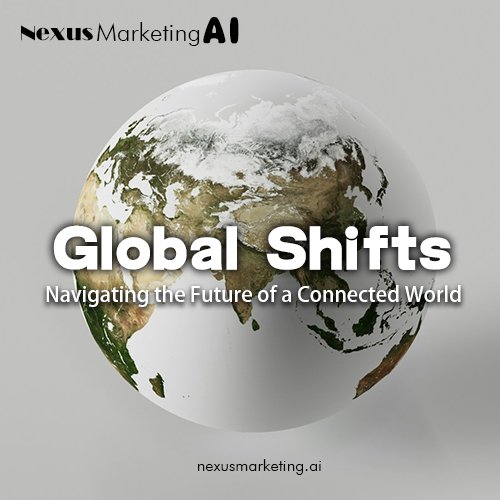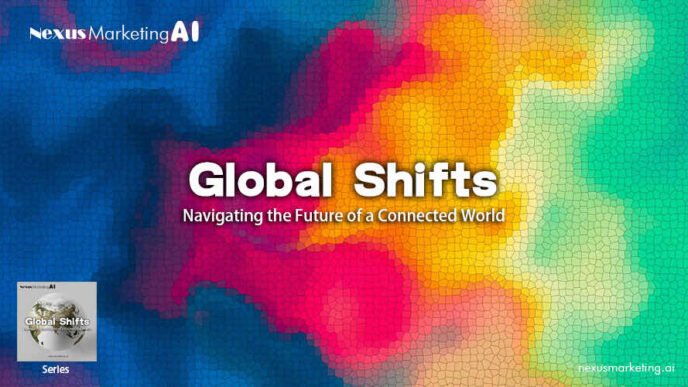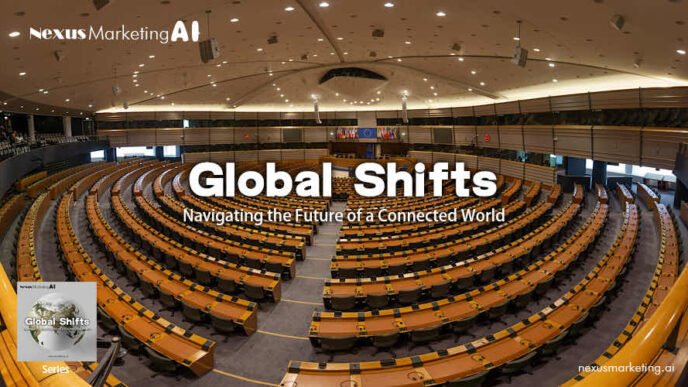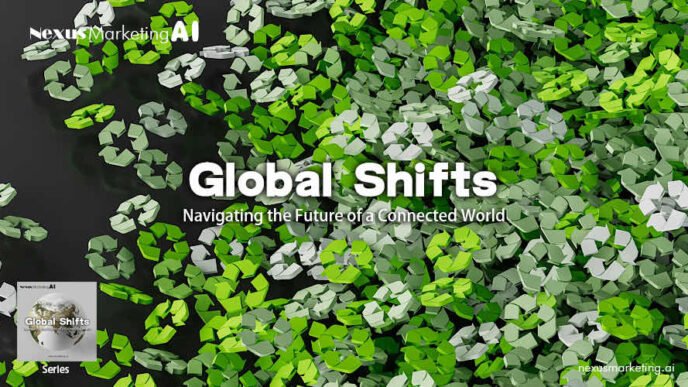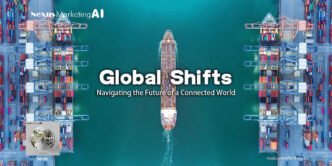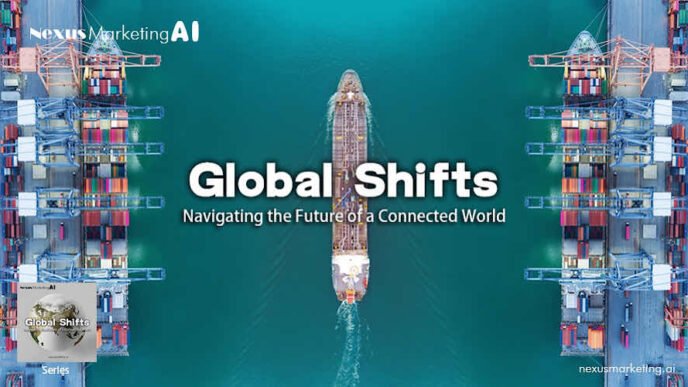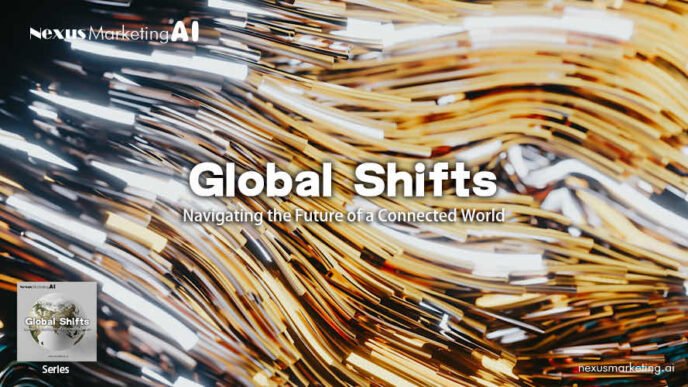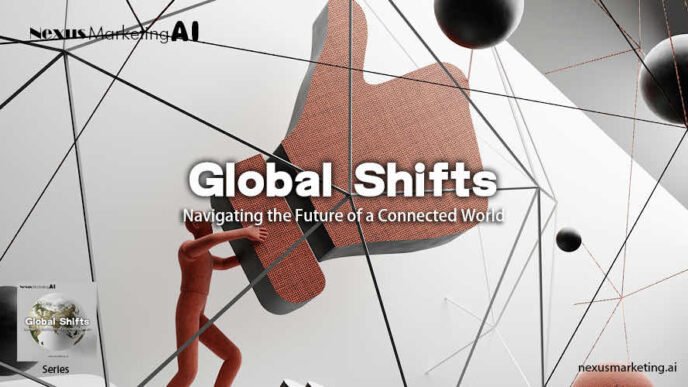Discover how technological globalization and digitalization are reshaping industries, connecting markets, and driving global innovation.
Global Shifts
Navigating the Future of a Connected World
As the world becomes more interconnected, the forces driving globalization have far-reaching impacts on economies, businesses, and societies. This series dives deep into the core elements shaping today’s global landscape, from technological innovation and economic integration to cultural exchange and environmental sustainability.
Through a comprehensive exploration of these topics, “Global Shifts” offers thought-provoking insights into how businesses can adapt to this rapidly changing environment. Whether you’re a leader aiming to stay ahead of global trends or a professional seeking to understand the shifting dynamics of global trade, this series provides the essential knowledge to navigate the future of globalization.
Series
- Episode1.Globalization 101: Understanding the Basics
- Episode2.Economic Globalization: Trade and Investment Flows
- Episode3.Technological Globalization: The Role of Digitalization
- Episode4.Cultural Globalization: Cross-cultural Exchange and Influence
- Episode5.Political Globalization: Global Governance and Multilateralism
- Episode6.Sustainability in Globalization: Environmental Impact and Solutions
- Episode7.Global Supply Chains: Challenges and Opportunities
- Episode8.The Future of Globalization: Trends and Predictions
- Episode9.Challenges of Globalization: Inequality and Social Impacts
- Episode10.Globalization and Innovation: How Companies Stay Competitive
Table of Contents

Prefer to listen? Enjoy the audio version of this article
Curated audio version | Audio powered by AI
Defining Technological Globalization

Technological globalization refers to the increasing integration of technology across national borders, which has transformed industries, economies, and societies worldwide. The rise of digital technologies, such as the internet, mobile communications, and cloud computing, has accelerated the pace of globalization by facilitating the free flow of information, capital, and innovation across countries. Unlike previous waves of globalization that were driven by physical trade and migration, technological globalization is powered by digitalization, creating a more interconnected and accessible global economy.

Overview of Technological Globalization
Technological globalization encompasses the spread of digital infrastructure, platforms, and tools that enable individuals, businesses, and governments to connect, communicate, and collaborate in real time, regardless of geographic location. It has transformed traditional industries, giving rise to new business models, such as e-commerce and digital platforms, that have reshaped global trade and investment patterns. At its core, technological globalization breaks down physical barriers and opens up global markets to a wider range of participants.

The Importance of Digitalization in Globalization
Digitalization has become a driving force behind globalization, enabling faster communication, seamless international transactions, and the widespread dissemination of knowledge. It has made it easier for businesses to operate in multiple markets, for individuals to access global goods and services, and for cultures to interact across national boundaries. Furthermore, digitalization has lowered the cost of entry into the global economy, allowing even small businesses and startups to compete on a global scale. In this way, technological globalization not only enhances economic efficiency but also democratizes access to global opportunities.
The Impact of Digital Technology on Global Commerce

Digital technology has revolutionized global commerce, transforming how businesses operate, how goods and services are exchanged, and how consumers interact with markets. From e-commerce platforms to digital payment systems, digitalization has enabled a more connected and efficient global marketplace. It has also expanded access to new markets, reduced costs, and created opportunities for innovation and entrepreneurship on an unprecedented scale.

E-commerce: Transforming Global Trade
E-commerce has become one of the most significant developments in global trade, enabling businesses of all sizes to reach international markets. Platforms like Amazon, Alibaba, and eBay have created digital marketplaces where consumers can buy products from around the world with just a few clicks. This has drastically reduced the barriers to entry for small and medium-sized enterprises (SMEs), allowing them to compete with larger companies on a global scale.
The convenience and accessibility of e-commerce have also led to a surge in cross-border transactions, with consumers in one country easily purchasing goods and services from another. E-commerce has transformed not only retail but also industries like fashion, electronics, and even education, where online courses are now available to students worldwide. The global reach of e-commerce has reshaped supply chains, distribution networks, and consumer behavior, making it a critical driver of technological globalization.

Digital Payment Systems and Financial Technology
The rise of digital payment systems, or fintech, has been another key factor in the globalization of commerce. Digital payment platforms like PayPal, Stripe, and Alipay have simplified the process of making cross-border payments, reducing the friction associated with international transactions. These platforms allow businesses and consumers to send and receive payments instantly, overcoming the traditional challenges of currency conversion, bank processing times, and high transaction fees.
In addition to facilitating global trade, digital payment systems have also expanded financial inclusion, providing access to financial services for individuals and businesses in regions where traditional banking infrastructure is limited. Fintech innovations such as mobile payments and blockchain-based currencies are further transforming how value is exchanged across borders, contributing to a more seamless and interconnected global financial system.

Cloud Computing and Global Business Operations
Cloud computing has become a cornerstone of global business operations, enabling companies to manage data, applications, and services across multiple geographic locations with ease. By leveraging cloud platforms like Amazon Web Services (AWS), Microsoft Azure, and Google Cloud, businesses can scale their operations, access global markets, and collaborate in real time with teams around the world. Cloud computing allows companies to store and process vast amounts of data without the need for physical infrastructure, reducing costs and increasing operational efficiency.
For multinational corporations, cloud technology has revolutionized supply chain management, customer service, and product development. It enables businesses to synchronize their operations across borders, providing real-time insights into inventory levels, customer demands, and market trends. Additionally, cloud computing supports the global expansion of companies by allowing them to set up operations in new regions without significant upfront investment in infrastructure. This technology has become indispensable for modern businesses, fostering a more integrated and responsive global economy.

Blockchain and Supply Chain Transparency
Blockchain technology, originally developed as the underlying technology for cryptocurrencies like Bitcoin, has found new applications in global supply chain management. Blockchain’s decentralized and immutable ledger system provides a transparent and secure way to track the movement of goods, verify transactions, and ensure the authenticity of products. This is particularly important in global trade, where supply chains often involve multiple parties across different countries, increasing the risk of fraud, counterfeiting, and inefficiencies.
By implementing blockchain technology, businesses can create a shared, tamper-proof record of every step in the supply chain, from the sourcing of raw materials to the delivery of finished products. This not only improves supply chain transparency but also enhances trust between suppliers, manufacturers, and consumers. For example, blockchain is being used in industries like agriculture, pharmaceuticals, and luxury goods to ensure product authenticity, traceability, and compliance with regulations. As more industries adopt blockchain, it has the potential to transform global trade by reducing costs, increasing efficiency, and promoting ethical business practices.
The Role of the Internet and Communication Technologies

The internet and communication technologies have been fundamental to the acceleration of globalization, enabling businesses, individuals, and governments to interact across vast distances in real-time. These technologies have redefined how information is shared, how businesses operate, and how cultures interact on a global scale. The internet, in particular, has become a crucial infrastructure for global communication and commerce, breaking down geographical barriers and facilitating unprecedented levels of connectivity.

Internet Connectivity: Bridging Global Distances
The spread of internet connectivity has revolutionized global communication, making it possible for people in different parts of the world to interact seamlessly. High-speed internet access enables businesses to communicate with international clients, partners, and suppliers in real time, facilitating more efficient and effective cross-border collaboration. For individuals, the internet has become a tool for education, entertainment, and personal communication, allowing people to access information and connect with others regardless of their location.
The increasing availability of internet access in developing countries has also opened up new markets and opportunities for economic growth. Countries in Africa, Southeast Asia, and Latin America have experienced rapid increases in internet penetration, enabling local businesses to tap into global markets and consumers to access a wider range of goods and services. As global internet connectivity continues to expand, the world becomes more integrated, fostering innovation, trade, and social interaction on an unprecedented scale.

Social Media and Global Communication
Social media platforms like Facebook, Twitter, Instagram, and WeChat have become powerful tools for global communication, enabling individuals and businesses to connect with audiences around the world. Social media has not only facilitated personal interactions across borders but also transformed how companies market their products and services internationally. Brands can now engage with global consumers in real-time, promoting products, gathering feedback, and building brand loyalty across diverse cultural contexts.
In addition to its commercial applications, social media has played a key role in shaping global political and social movements. Platforms like Twitter have been used to organize protests, raise awareness about social issues, and spread news in regions where traditional media outlets may be restricted. Social media’s ability to quickly disseminate information across borders has made it a critical tool for both individuals and organizations seeking to engage in global dialogue.

Digital Platforms for Education and Learning
The rise of digital platforms for education, such as Coursera, Udemy, and edX, has dramatically expanded access to learning opportunities around the globe. These platforms provide online courses, certifications, and degree programs from some of the world’s top universities and institutions, allowing learners to access quality education regardless of their geographical location. This has been particularly impactful in developing countries, where access to higher education has traditionally been limited.
Digital education platforms have also democratized access to specialized knowledge and skills, helping individuals acquire the competencies needed in the global job market. With courses ranging from artificial intelligence to digital marketing, these platforms empower learners to stay competitive in an increasingly digital and globalized economy. Furthermore, these platforms facilitate lifelong learning, allowing professionals to continue their education and update their skills as industries evolve.
In addition to individual benefits, digital platforms are also helping businesses upskill their workforce on a global scale. Companies can now provide training and development opportunities to employees worldwide, ensuring that their teams are equipped with the latest knowledge and tools to stay competitive in the global market.

Remote Work and Global Teams
The development of remote work technologies, such as Zoom, Microsoft Teams, and Slack, has transformed the global workplace, enabling companies to build and manage teams across borders. The COVID-19 pandemic accelerated this trend, proving that businesses can operate efficiently with a geographically distributed workforce. Remote work technologies allow teams to collaborate in real time, regardless of location, enabling businesses to tap into a global talent pool and reduce operational costs.
Global teams can now be composed of employees from different time zones, cultures, and backgrounds, bringing diversity to decision-making and problem-solving processes. This has opened up new opportunities for companies to expand their talent acquisition strategies, hiring individuals based on skills rather than geographical proximity. Moreover, remote work has provided workers with more flexibility, enabling them to balance their professional and personal lives while contributing to the global economy.
However, managing remote global teams also presents challenges, such as communication barriers, time zone differences, and maintaining a cohesive company culture. Despite these challenges, remote work is likely to remain a central feature of the globalized economy, offering both businesses and workers unprecedented flexibility and access to opportunities.
The Expansion of Digital Infrastructure

As the backbone of technological globalization, digital infrastructure plays a vital role in connecting countries, businesses, and individuals. The rapid development of high-speed internet, data centers, and mobile networks has enabled the seamless exchange of information and services across borders, transforming industries and economies worldwide. This expansion of digital infrastructure is driving greater global connectivity, but it also highlights the need to address disparities in access to technology.

5G Networks: Enabling Global Connectivity
The rollout of 5G technology is revolutionizing global connectivity by providing faster, more reliable internet connections. 5G networks have the potential to transform industries such as healthcare, manufacturing, and transportation by enabling innovations like autonomous vehicles, smart cities, and real-time telemedicine. For businesses, 5G allows for more efficient communication, faster data processing, and enhanced cloud computing capabilities, all of which are critical for global operations.
The deployment of 5G is also facilitating the growth of the Internet of Things (IoT), which connects devices and systems across the globe, allowing for real-time data collection and analysis. From agriculture to energy, IoT applications powered by 5G are increasing efficiency and productivity, enabling businesses to better manage resources and improve decision-making. As 5G networks expand, they will play a crucial role in fostering deeper global integration and supporting the continued evolution of technological globalization.

Data Centers and Global Information Flows
Data centers are the hubs of global digital infrastructure, storing and processing the vast amounts of data generated by businesses, governments, and individuals around the world. The growth of cloud computing, streaming services, and big data analytics has led to a surge in demand for data center capacity. Companies like Amazon, Google, and Microsoft have built massive data centers across multiple continents to support their global operations, enabling seamless data exchange and real-time collaboration.
Data centers are critical to ensuring that information flows freely and securely across borders. They support a wide range of services, from e-commerce to digital communication, and are essential to the functioning of the global digital economy. However, the expansion of data centers also raises concerns about energy consumption and environmental sustainability, as they require significant resources to operate. To address these concerns, many companies are investing in renewable energy sources and energy-efficient technologies to reduce the environmental impact of data centers.

Digital Divide: Unequal Access to Technology
While technological globalization has brought many benefits, it has also highlighted the digital divide between countries and regions with access to advanced technology and those without. The digital divide refers to the gap between individuals and communities that have access to modern information and communication technologies (ICT) and those that do not. This disparity is particularly pronounced in developing countries, where lack of infrastructure, affordability, and digital literacy can limit access to the internet and other digital tools.
The digital divide poses a significant challenge to global equality and inclusivity. Without access to the internet and digital services, individuals and businesses in underserved regions are unable to fully participate in the global economy. This limits their opportunities for education, employment, and economic development. Bridging the digital divide will require concerted efforts from governments, businesses, and international organizations to invest in digital infrastructure, promote affordable access, and provide digital literacy training.
The Opportunities and Challenges of Technological Globalization

Technological globalization has created unprecedented opportunities for economic growth, innovation, and cross-border collaboration. However, it has also introduced significant challenges that businesses, governments, and societies must address. From cybersecurity risks to job displacement due to automation, understanding both the benefits and potential downsides of technological globalization is essential for shaping a more equitable and sustainable global economy.

Opportunities Created by Digitalization
Technological globalization offers numerous opportunities for countries, businesses, and individuals. Digital platforms, cloud computing, and advanced communication technologies have enabled businesses to expand globally, tap into new markets, and access a broader talent pool. Digitalization also promotes innovation by providing companies with the tools to develop new products and services, improve efficiency, and increase their competitive edge in the global market.
For developing countries, digitalization can be a catalyst for economic growth and poverty reduction. By investing in digital infrastructure and promoting digital literacy, developing nations can integrate into the global economy, attract foreign investment, and create new industries. In particular, the growth of e-commerce and digital services has allowed small businesses and entrepreneurs in these regions to reach international customers, leveling the playing field and creating new opportunities for economic development.

Cybersecurity Risks and Data Privacy
As businesses and governments increasingly rely on digital technologies, the risks associated with cybersecurity and data privacy have grown. Cyberattacks, data breaches, and hacking have become more frequent, threatening not only individual businesses but also national security. The interconnected nature of global digital networks means that vulnerabilities in one country or company can have far-reaching consequences across the globe.
Data privacy is another significant concern in the age of technological globalization. The collection and processing of personal data by multinational corporations, social media platforms, and digital services have raised questions about how that data is used, stored, and protected. In response, governments around the world have introduced regulations, such as the European Union’s General Data Protection Regulation (GDPR), to safeguard data privacy and protect consumers’ rights. However, the challenge of balancing innovation with security and privacy remains a complex issue that will require ongoing cooperation between governments and the private sector.

Job Displacement and Automation
Automation, artificial intelligence (AI), and robotics are transforming industries worldwide, increasing productivity and reducing costs. However, these technological advancements are also displacing jobs, particularly in sectors such as manufacturing, retail, and transportation, where routine tasks are increasingly being performed by machines. The automation of jobs has sparked concerns about the future of work, as low-skilled workers in both developed and developing countries may find themselves unemployed or forced to shift to lower-paying jobs.
To address these challenges, governments and businesses must invest in education and training programs that equip workers with the skills needed to thrive in a digital economy. Upskilling and reskilling initiatives can help workers transition into new roles that require creativity, problem-solving, and other uniquely human skills that cannot be easily replicated by machines. By fostering a culture of lifelong learning and providing support for displaced workers, societies can mitigate the negative effects of automation and ensure that the benefits of technological globalization are shared more equitably.
The Future of Technological Globalization

Technological globalization is reshaping the world in profound ways, driving economic growth, enhancing global collaboration, and creating new opportunities for innovation and connectivity. However, as digital technologies continue to evolve, so do the challenges associated with them. The future of technological globalization will depend on how well businesses, governments, and societies can navigate these challenges while maximizing the benefits of digital transformation.

Emerging Technologies and Global Impact
Emerging technologies such as artificial intelligence (AI), virtual reality (VR), augmented reality (AR), and quantum computing are poised to further transform global industries. AI is already being used to enhance decision-making processes, automate complex tasks, and create personalized consumer experiences. VR and AR are revolutionizing sectors like education, healthcare, and entertainment, while quantum computing has the potential to solve problems that are currently beyond the reach of traditional computing.
These technologies will further integrate economies and accelerate globalization by enabling faster, more efficient communication, data processing, and problem-solving. However, they also raise important questions about ethical use, regulatory frameworks, and the societal impacts of these advancements.

Balancing Innovation with Ethical Considerations
As technological globalization continues to expand, it is essential to balance innovation with ethical considerations. Issues such as data privacy, cybersecurity, job displacement, and the digital divide must be addressed to ensure that the benefits of digitalization are accessible to all, and that technology is used responsibly. Governments, businesses, and international organizations must work together to establish regulations and policies that protect individuals and communities while fostering innovation and economic growth.
Technological advancements must also be guided by principles of inclusivity and sustainability, ensuring that digital tools are accessible to underserved populations and that they contribute to a more equitable global economy.

Link to Next Episode: Cultural Globalization
The next episode, “Cultural Globalization: Cross-cultural Exchange and Influence,” will explore how technology has played a critical role in the exchange of cultures, ideas, and values across borders. From social media to digital media platforms, cultural globalization is shaping how people around the world interact, communicate, and influence each other in a rapidly changing global landscape.
FAQs
-
How has digitalization accelerated globalization?
Digitalization has accelerated globalization by reducing the time and cost associated with international communication, trade, and collaboration. Technologies such as the internet, cloud computing, and digital platforms enable businesses to operate globally, reach new markets, and streamline cross-border operations. This connectivity facilitates the rapid exchange of information, ideas, and resources, driving global economic integration.
-
What role does the internet play in technological globalization?
The internet is a foundational element of technological globalization, connecting billions of people and businesses worldwide. It enables instant communication, access to information, and the operation of digital platforms that support e-commerce, remote work, and global collaboration. The internet has transformed how we live, work, and interact, making the world more interconnected than ever before.
-
How does digital technology impact global supply chains?
Digital technology, such as AI, IoT (Internet of Things), and blockchain, enhances the efficiency, transparency, and security of global supply chains. These technologies enable real-time tracking of goods, predictive analytics for demand forecasting, and streamlined logistics management. By integrating digital tools, companies can reduce costs, optimize inventory, and respond more quickly to market changes.
-
What is the role of artificial intelligence in global business?
Artificial intelligence (AI) plays a significant role in global business by automating processes, analyzing large datasets, and enabling personalized customer experiences. AI-driven technologies help companies improve decision-making, optimize operations, and innovate faster. In the global context, AI supports everything from predictive maintenance in manufacturing to advanced analytics in marketing.
-
How does digitalization affect cross-border e-commerce?
Digitalization has revolutionized cross-border e-commerce by providing consumers and businesses with access to global markets through online platforms. E-commerce giants like Amazon, Alibaba, and Shopify allow companies to sell products worldwide, bypassing traditional retail barriers. This accessibility has enabled small businesses and entrepreneurs to compete on a global scale, reaching customers far beyond their local markets.
-
What are the cybersecurity challenges of technological globalization?
As businesses and consumers increasingly rely on digital technologies, cybersecurity threats have become a major concern. Cyberattacks, data breaches, and ransomware pose significant risks to global businesses, threatening data security, financial stability, and brand reputation. Companies must invest in robust cybersecurity measures, such as encryption, firewalls, and continuous monitoring, to protect their digital assets in an interconnected world.
-
How does digitalization contribute to the digital divide?
While digitalization has connected the world, it has also highlighted the digital divide—the gap between those with access to digital technologies and those without. This divide is often seen between developed and developing countries, urban and rural areas, and among different socio-economic groups. Bridging this gap requires investments in digital infrastructure, education, and affordable technology to ensure that everyone can benefit from technological globalization.
-
What is the impact of technological globalization on employment?
Technological globalization impacts employment by automating repetitive tasks, creating new job opportunities in tech-driven industries, and changing the skills required in the workforce. While some jobs are at risk of being replaced by automation, new roles in AI, cybersecurity, data analysis, and digital marketing are emerging. Reskilling and upskilling initiatives are essential to prepare workers for the evolving job market.
-
How does blockchain technology influence global trade?
Blockchain technology influences global trade by providing a secure, transparent, and tamper-proof way to record transactions. It enhances the traceability of goods, reduces fraud, and simplifies cross-border payments. Blockchain is particularly valuable in industries like supply chain management, finance, and logistics, where trust and transparency are crucial.
-
What are the ethical considerations of technological globalization?
Technological globalization raises several ethical considerations, including data privacy, algorithmic bias, and the impact of automation on jobs. Companies must navigate these challenges by implementing ethical standards, ensuring fair use of technology, and being transparent about data collection and AI usage. Governments and organizations are also working to establish regulations that protect individuals and promote responsible use of digital technologies.


